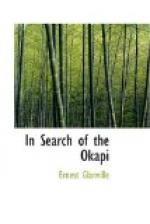“I should like nothing better than to study animals in their home,” said the boy, burning with excitement.
“And the two of you think you would like to join me in my expedition?”
Mr. Hume looked at them out of calm yellowish eyes as if he were studying them.
“We should,” they said eagerly.
“Think it will turn out a picnic—a glorified sort of camping-out, with black fellows to wait on you, and a lot of shooting and fishing? Is that your idea?”
“We were talking about that this morning,” said Compton, “and we came to the conclusion that exploring was hard work. We are prepared for rough living.”
“That’s right. And you tell me that you are free to go without giving anxiety to relatives, eh?”
“We neither of us have near relatives.”
Mr. Hume stood up and felt each one over in turn, making them draw deep breaths.
“Seem sound,” he mused, “in wind and limb. But there is one thing. The great danger in Central Africa is from fever—not from animals or blacks.” Here he took down a bottle of white powder, and placed a large pinch in a wine-glass of water. “Quinine is the traveler’s stand-by, but there are some who cannot take quinine, It has no effect on them, and such people have no business to set foot in fever districts. Drink this?”
Compton emptied the glass with a wry face, and Venning, when his turn came, shuddered; but they got the dose down, and smiled.
“Now,” said Mr. Hume, “you both of you give me references to the headmaster of your school, and I will give you one in return. I will make inquiries about you, and I would advise you to make inquiries about me. You can come back here to-morrow afternoon, and if we are mutually satisfied, we will then fix up a contract.”
“I don’t think we require a reference,” said Venning.
“Why not?” said Mr. Hume, sharply.
“Because,” blurted out Venning, turning red—“because you have lived among animals.”
Mr. Hume laughed heartily with a deep rumbling laugh.
“Animals are tricky, boy; and yet,” he added, “there may be a meaning in what you say. They have a dignity in death that is grand. Go and make your inquiries, lads. I am Dave Hume, the hunter, and my life has been passed in wild lands, but there are some in London who know me.”
He rose up to open the door, and Venning overtopped him by inches, yet he did not look either small or unwieldy. His step was springy, and his head, poised on a massive neck, was well set, with the chin raised. He was a man, evidently, who had always looked the world straight in the face. His eyes had a yellowish tinge, and in their colour and their calm they reminded Venning somehow of a lion, an impression heightened by the tawny hue of a long beard.




